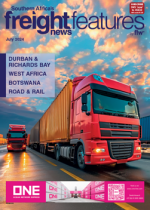While the Economic Community of We st A f r ic a n States (Ecowas) was once a leader in intra-African trade and cooperation, instability among members is threatening the rollout of the African Continental Free Trade Area (AfCFTA), Since 2020 there have been four military coups among the 15 member countries.They are Mali (2020 and 2021), Guinea (2021), Burkina Faso (2022) and Niger (2023).Mali, Burkina Faso and Niger have subsequently pulled out of Ecowas.Gerhard Erasmus of tralac warns that AfCFTA objectives are “directly undermined by the wars, coups, and instability that plague Africa. As a basic requirement, the f low of goods, services and investment across borders requires stability, peace, and good governance”. Of the four successful coups, the most important from a logistics and minerals export perspective was Guinea, which is home to five major ports and is the world’s second-largest producer of bauxite, which is used in the production of aluminium.Despite ongoing social unrest, the International Monetary Fund estimates that real gross domestic product growth increased to 5.7% of GDP in 2023, driven largely by mining of bauxite and gold, which contributed a further 9.4% of GDP.Ecowas was established in 1975 to address the political and economic challenges facing the countries in the region.These challenges extend beyond the four coup states.In his message to mark the 49th anniversary of the founding of the organisation in May, president of the Ecowas Commission, Omar Alieu To u r a y, s a i d that “insecurity continues to threaten our region. “Some of our member states are battling terrorist groups on a daily basis and a large number of our population faces displacement and food insecurity”.Calling for unity, he said “strengthening regional unity, peace and security is the theme we have chosen for the celebration of this 49th anniversary”. Nnamdi Obasi of the International Crisis Group describes the exit of the three countries from Ecowas as an unprecedented event that could have far-reaching diplomatic, security and economic consequences.“It also jeopardised multilateral initiatives to tackle transnational security challenges, particularly jihadist insurgencies, banditry, and organised crime. “Furthermore, it deepened rifts between the bloc’s Western-leaning elected governments (led by Nigeria, Côte d’Ivoire and Ghana) and its four military-run countries. “Mali, Burkina Faso and Niger have recently terminated their long-standing defence pacts with France and/or scaled-down security partnerships with the European Union and the US. “These three countries have increasingly turned instead to Russia as their security partner of choice.”

